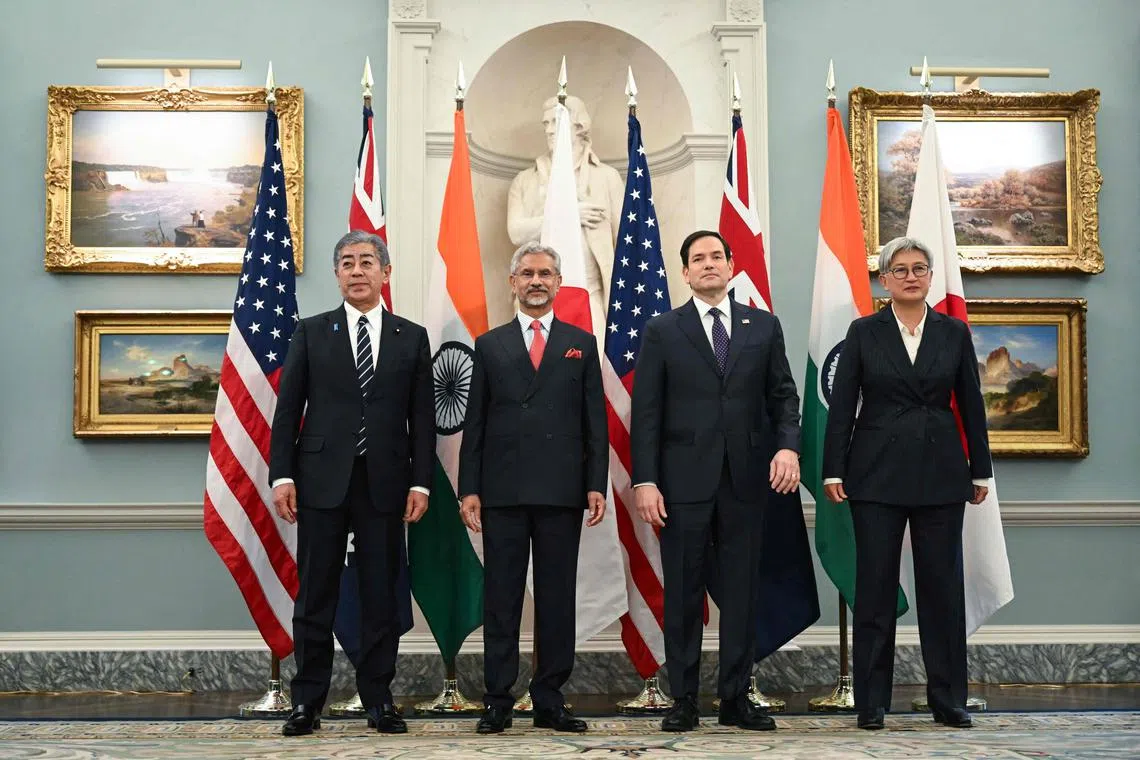Quad foreign ministers meet US top diplomat Marco Rubio in signal of Trump’s China focus
Sign up now: Get ST's newsletters delivered to your inbox

(From left) Japan's Foreign Minister Takeshi Iwaya, India's Foreign Minister Subrahmanyam Jaishankar, US Secretary of State Marco Rubio and Australia's Foreign Minister Penny Wong met in Washington.
PHOTO: AFP
WASHINGTON – The United States, Australia, India and Japan recommitted to working together on Jan 21, after a first meeting of the China-focused “Quad” grouping’s top diplomats since President Donald Trump returned to the White House.
In a joint statement after the talks in Washington, hosted by US Secretary of State Marco Rubio on his first day in the job, the four nations said officials would meet regularly to prepare for an upcoming leaders’ summit in India, expected in 2025.
The four nations share concerns about China’s growing power, and analysts said the meeting was designed to signal that countering Beijing is a top priority for Mr Trump, who began his second term in office on Jan 20.
Mr Rubio earlier said he would stress the importance of working with allies “on the things that are important to America and Americans” during the meeting.
He posed with Australia’s Ms Penny Wong, India’s Mr Subrahmanyam Jaishankar and Japan’s Mr Takeshi Iwaya in front of the flags of their countries before the meeting at the State Department.
“Significant that the Quad (foreign ministers’ meeting) took place within hours of the inauguration of the Trump administration,” Mr Jaishankar said on X after the meeting.
“This underlines the priority it has in the foreign policy of its member states.”
The four nations restated their “shared commitment to strengthening a free and open Indo-Pacific where the rule of law, democratic values, sovereignty and territorial integrity are upheld and defended,” the joint statement said.
“We also strongly oppose any unilateral actions that seek to change the status quo by force or coercion,” it added, an apparent reference to the threat that China will act on its claim to sovereignty over Taiwan.
That includes in the East China Sea, where Japan is locked in a territorial dispute with China, and in the contested South China Sea, Japan’s government said in a later statement.
Mr Iwaya also raised concerns about North Korea’s nuclear weapons and missile development at the gathering and asked for help to resolve a dispute with Pyongyang over the past abductions of Japanese by North Korea.
In a separate bilateral meeting, Mr Iwaya told Mr Rubio and Mr Trump’s national security adviser, Mr Mike Waltz, that Japan has no choice but to continue strengthening its defence capabilities given the security situation in East Asia, Japanese foreign ministry press secretary Toshihiro Kitamura told a news conference.
Tokyo is undertaking its biggest military build-up since World War II with a plan to double defence spending by 2027.
The return of Mr Trump has prompted expectations Washington may put more pressure on allies to further step up defence spending.
Mr Iwaya also asked Mr Rubio to create an environment where Japanese businesses can invest without concerns.
Former US president Joe Biden in January blocked Nippon Steel’s proposed US$14.9 billion (S$20.18 billion) purchase
Japan hopes to arrange a face-to-face meeting between Mr Trump and Mr Ishiba in February or March, Mr Kitamura said.
Mr Rubio also met separately with Ms Wong and Mr Jaishankar.
A key aim for Australia is to secure assurances from Washington about the massive Aukus defence project. It is
Ms Wong told a news conference in Washington that she had a “very positive discussion” with Mr Rubio on Aukus.
Ms Wong and Mr Rubio discussed efforts to continue bilateral defence cooperation, Aukus, as well as critical minerals and global supply chain security, State Department spokesperson Tammy Bruce said in a statement after the meeting.
“The Secretary and the Foreign Minister hailed the longstanding US-Australia Alliance as foundational to international security and prosperity, and to a secure and prosperous Indo-Pacific region free from coercion,” she said.
Ms Wong added that there was “a great deal of optimism and confidence about the opportunities ahead”.
China has denounced the Quad as a Cold War construct and said Aukus would intensify a regional arms race.
Mr Trump’s officials were working on scheduling another gathering of the foreign ministers at the White House as well, a person involved in planning meetings said.
The Quad grouping met many times during the Biden administration, with a focus on Beijing’s military and economic activities in the Indo-Pacific, particularly in the South China Sea where US allies have pushed back against China’s territorial claims.
The grouping has also pledged to advance cooperation in cyber security to protect supply chains and critical infrastructure, including undersea cables. REUTERS


